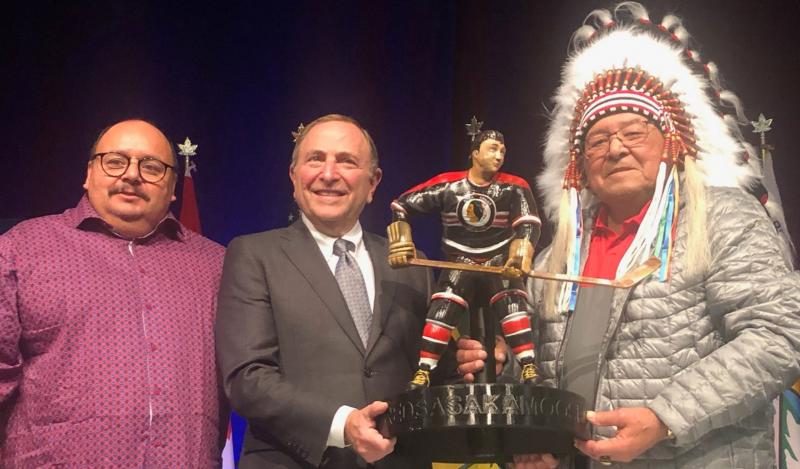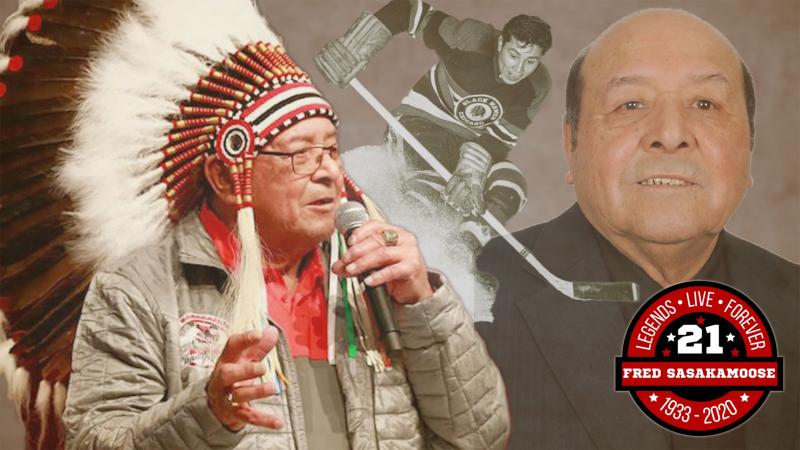COVID is real and devastating: Neil Sasakamoose
Neil Sasakamoose lost his father to COVID-19 last year.
Fred Sasakamoose, a former professional hockey player and a well-recognized leader in the Canadian First Nations community, died in November 2020. He was 86.
Fred’s family is still grieving his loss. COVID not only took Fred from them, it has prevented them from recovering from his loss in traditional ways.
COVID-19 was something Neil and his family took seriously and worked to educate their community about – including Fred. Neil works for the Battleford Agency Tribal Chiefs. Fred was an integral part of two of their early ad campaigns, doing everything he could to convince people to stay safe.
Then in November, one of Fred and Loretta’s family members who occasionally provided care became ill with a high fever and headache.
“On November 20, my mother called me and told me my dad was sick,” Neil recalls. He had spoken to his father just the day before to tell him his book, “Call Me Indian,” was going to press. “I knew he wasn’t feeling good, that he was tired. But then my mother told me he was having trouble breathing and I just knew. I told them to get him to the hospital.”
Fred got to the hospital in Shellbrook, suffering from a fever and having trouble breathing. Shortly after, they learned their family member had tested positive for COVID-19. Neil called the hospital and advised them his father was likely COVID positive.
“My dad called me at 7:30 p.m. from the hospital…. I heard this pitiful, sad attempt to say hello. It took him a long time to say hello, and when he did, it was three syllables, it took him three breaths to say it. Then he said ‘I can’t breathe.’ ”.
His father started to cry, which was highly unusual.
“He knew how dangerous (COVID-19) is,” Neil recalls.
Fred was admitted to the Victoria Hospital in Prince Albert later that day. His first few days there, he didn’t sound bad, as he was on oxygen. Neil talked to him regularly and sent him video messages from NHL players who wanted to show him encouragement.
By Monday, Fred’s breathing started to deteriorate. He sounded better, but he was not.
Neil coordinated a call that day between his father and his two uncles – Fred’s brothers – Peter and Leo.
“They talked for 15 minutes. It was really sad. It was like listening to three little kids, three little brothers. They were worried about (my dad). It was the last time they talked.”
That day, they got Fred’s test results back – he was positive for COVID-19. In the meantime, the contact tracing began within their family. Twenty members of family would test positive.
On Tuesday, at 6 a.m., four days after he got that first phone call that Fred was feeling sick, Fred’s doctor called Neil. His dad was not improving. Some decisions needed to be made about his care. Neil’s fears and knowledge of this pandemic were becoming his family’s reality.
Neil spoke to his mother, who was ill, but still at home. With her so ill and his other siblings also sick, she ultimately left the decisions up to him.
“She told me she was lucky enough to have 65 years with him through trials, tribulations, everything,” Neil said.
Neil decided against intubating his father as that wasn’t what Fred wanted.
“My dad told me, ‘If I can’t walk out of here, I don’t want to leave here. I want to still be independent,’.” Just the week before Fred went into the hospital with COVID, he was out driving a quad, helping clear snow after a huge snowstorm hit.
“He was a Saskatchewan person. Just so independent,” Neil said. “He didn’t want to have to be cared for.”
The doctors told Neil that they didn’t feel Fred could recover after being on a ventilator due to the amount of COVID-19 pneumonia in his lungs. It was decided Fred would get pain medication to make him feel better temporarily and then he would just fall asleep.
Neil requested to see his father as no one else could – they were all in isolation – but he wasn’t allowed because of infection protocols.
“It was really hard,” Neil said through tears. “Talking someone through their death on a cell phone. That’s what COVID does.”
As he spoke to his dad on the phone, Neil remembers the fear his father felt. “He told me he didn’t want to die. He wanted to go home. I had to tell him that he wasn’t going to heal, that he wasn’t coming out of there. I spoke with him four or five times. He would hang up when he started to cry, then phone me back.”
Fred eventually got to a place where he wasn’t scared anymore, telling Neil he already saw those he knew who had already passed appear in his room.
“I told him, ‘Those guys are going to put their hand out. Grab their hand and follow them’,” Neil said.
“I’m ready to go to heaven,” Fred told his son.
“We’re going to be good here. We’ll look after mom,” Neil told his father.
Just before 3 p.m., the care staff called Neil to let him know his dad had passed very quickly. His mother’s test results came back the same day. She was positive.
Neil made phone call after phone call, letting people know his dad was gone, before the shock wore off. He also posted on the Facebook page he’d made for his dad. Then the calls started to come in.
“My dad was a national hero. Everyone wanted interviews. I had to remove myself from everything.”
They had to wait 10 days to bury his father and make other decisions about his funeral that were against First Nations protocols for honouring a person of Fred’s stature, but were in line with COVID-19 rules about gatherings.
“My mom is very spiritual and religious, and she was raised in how to lay people to rest. But we couldn’t do it that way because of COVID,” Neil noted.
They only had 30 people at the funeral. Fred’s immediate family numbers 164. No hugging. Everyone leaving right after the funeral. No gathering to mourn and draw strength from each other.
“I couldn’t hug my mother,” Neil said. “I followed every rule (of the COVID guidelines). It was horrible, but I wanted to demonstrate that if we follow the rules, if we are disciplined and patient, we can get through this.”
He is still grieving his father. His entire family is. They didn’t get to deal with his death their traditional way, and they are still suffering today.
This is what COVID-19 does. It is real and it is devastating.
But now there is hope through the COVID-19 vaccine. Neil has heard that there are many in the First Nations, and outside their community, who are hesitant about receiving one.
The vaccine works, Neil insists. “Listen to the doctors and nurses. Be safe. Get a vaccine.”
“If you want your freedom, if you want your life back, the only way is through the vaccine,” he stated.
Fred would have got a vaccine if it was available, Neil is sure. But he died a month before any were available in Saskatchewan.
“Don’t let that happen to anyone else. Get a vaccine.”




